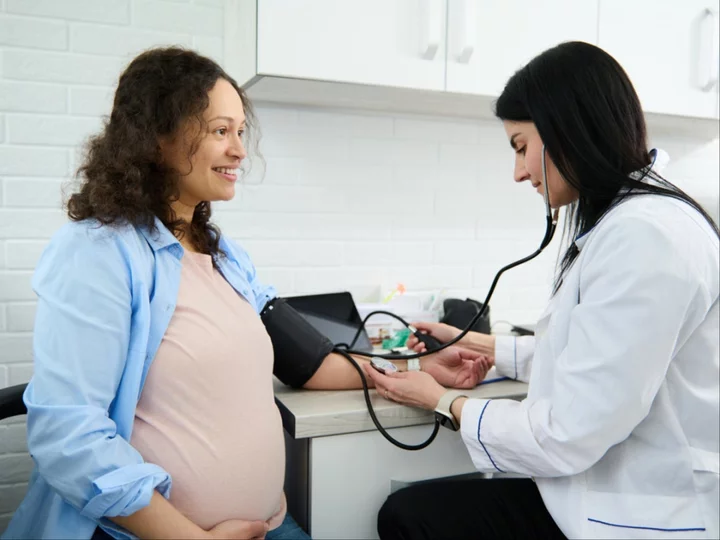
What is eclampsia and how rare is it?
Eclampsia is a rare complication of pre-eclampsia and can cause fits, seizures and strokes. The condition eclampsia describes the type of convulsion or fit – an involuntary contraction of the muscles – pregnant women can experience from week 20 of the pregnancy or immediately after the birth. What are the symptoms/ warning signs? Pre-eclampsia is a condition that affects some pregnant women, usually during the second half of the pregnancy (from 20 weeks) or soon after the baby is delivered. Early signs of pre-eclampsia include having high blood pressure (hypertension) and protein in your urine, according to the NHS. It’s difficult to notice the signs, but they can be picked up during routine antenatal appointments. Further symptoms of pre-eclampsia include a severe headache, vision problems, such as blurring or flashing, pain below the ribs, vomiting and sudden swelling of the face, hands or feet. How common are pre-eclampsia and eclampsia? Most cases of pre-eclampsia do not lead to serious problems or complications, but there is a risk that the mother will develop fits and seizures, called eclampsia, which can be life-threatening for the mother and baby. However, this is rare. According to the NHS, the earlier pre-eclampsia is diagnosed and monitored, the better the outlook for the mother and baby. Most women make a full recovery after having a fit, but they can put the mother and baby’s health at risk. According to the pregnancy charity Tommy’s. eclampsia is quite rare in the UK, with an estimated one case for every 4,000 pregnancies. What are the causes of pre-eclampsia? Though the exact cause of pre-eclampsia is not known, its thought to occur when there is a problem with the placenta – the organ that links the baby and mother’s blood supply. Who is affected by pre-eclampsia? A number of health conditions can increase your chances of developing pre-eclampsia, including having diabetes, high blood pressure or kidney disease before pregnancy. Having an autoimmune condition, such as lupus or antiphospholipid syndrome, or having high blood pressure or BMI, can also increase your chances of pre-eclampsia. A family history of the condition, being older than 40, or having more than 10 years since your last pregnancy can also increase your chances of pre-eclampsia. Expecting multiple babies, like twins or triplets, may also put a patient at risk. What are the treatments for pre-eclampsia? After being diagnosed with pre-eclampsia, a patient will be monitored closely by a specialist to see how severe the condition is. According to NHS guidance, the only way to cure pre-eclampsia is to deliver the baby, hence why monitoring the mother and baby is crucial until the child is delivered. Patients are often offered medicine to lower their blood pressure until the baby is born. Read More Tori Bowie: Pregnant US Olympic sprinter’s cause of death revealed Vegan family writes letter to neighbours requesting they close their windows when cooking meat Kelis addresses Bill Murray dating rumours for the first time How to take care of your mental health at festivals How to stop hay fever fast? Only one thing worked for me Jamie Foxx’s rep addresses conspiracy Covid vaccine left actor ‘paralyzed and blind’
1970-01-01 08:00

How to take care of your mental health at festivals
Festival season is upon us, with Glastonbury taking place near the end of June. While we’re well versed in how to take care of our physical health at a festival (yes, you really should take a hat in case the sun comes out), what about the mental health side of things? Mike McAdam, 38, co-founded Blink Mental Health, which provides mental health support at festivals. After his mental health deteriorated in 2017, McAdam found his condition was too serious for primary care, but not extreme enough for secondary care. He accepts there are lots of brilliant charities and campaigns encouraging people – particularly men – to talk about their mental health and reach out if they need it, but “it’s incredibly difficult to get help”, he suggests. This is where the idea for Blink came from – the ultimate aim is to set up a ‘Blink Bank’ providing money for private therapy for those who are stuck on waiting lists. McAdam accepts that is “really ambitious and would cost millions”, so as a starting point, Blink provides wellbeing at festivals. Blink is going to six festivals this summer – including Boomtown and Wilderness – where it will set up dedicated tents which McAdam calls “a place to relax, get away from things [and] take your mind off the festival”, with bean bags and mindful activities such as colouring and jigsaw puzzles. Blink also offers between 12 and 18 hours a day of free talking therapy with fully qualified and accredited psychologists or psychotherapists. “It’s not just about diagnosed mental health conditions, everyone should look after [their] mental health,” McAdam says. He suggests festivals are a great place to open up conversations around mental health. “At festivals, people tend to explore new experiences – whether that’s food, music, dance or activities – so one reason we go to festivals is because people want to explore new experiences, [and] we find them more open-minded to talk and access therapy,” he says. Plus, he accepts festivals can be “full-on”, and don’t always have “that space where you can chill out”. While McAdam suggests early intervention is key when dealing with mental health, there are some things you can do to do yourself if you’re going to a festival this summer… Be prepared Before heading off to the festival, McAdam recommends being as prepared as possible. This could include “taking earplugs, a decent sleeping bag, making sure we have clothes for all weathers if we can”, he says. “Because if you can’t get a decent night’s sleep, if you’re absolutely freezing, that will affect your physical and mental health.” Lowri Dowthwaite-Walsh, senior lecturer in psychological interventions at UCLan, agrees with the importance of planning ahead. “If you have any vulnerabilities, such as pre-existing mental health difficulties or known triggers, plan ahead for how you can manage these,” she says. “By having a plan of what to do in the event of feeling low or anxious, you’ll be able to enjoy your time more and be more relaxed.” Stay well-fed and watered McAdam recommends taking a water bottle you can refill throughout the festival, and adds: “Try and eat regularly.” He suggests it can be “very, very easy to forget about eating or drinking [water]” at a festival, or you might not want to buy much food as it can be expensive on-site. However, taking your own snacks and bottle could go a long way to helping you be as comfortable as possible. Dowthwaite-Walsh adds: “Long days, warm weather and alcohol consumption can dehydrate you and this can lead to headaches, feeling fatigued and struggling to concentrate and make good decisions” – which means drinking plenty of water is crucial. Camp wisely “Try and camp with people you feel safe with,” is McAdam’s advice. And if you’re going to a festival with different options for camping – for example, Wilderness has a quiet camping area – choose the place that suits you best. If you’re going solo, McAdam says: “Try and find the area that may suit your needs.” Be drink and drug-aware “Alcohol and drugs have a direct impact on your mental health, so it’s important to discuss your choices with friends and people you trust. You can also get support from first responders at the festival if you have issues with any substances,” says Dowthwaite-Walsh. Take the pressure off “There’s a huge, huge thing about fear of missing out”, McAdam says. “They’re extremely exciting places, [with] so much going on. “There won’t be an opportunity to explore and see everything that you may want to, so as hard as it is, please do not try and put too much pressure on yourself trying to get around everything you want to see.” This could “burn you out and add additional stress”, he says, so McAdam recommends being “realistic about what you can see”. Stay connected If you are with friends, Dowthwaite-Walsh recommends staying connected. “Being able to enjoy yourself with friends helps to deepen the experience of a festival but also keeps you safe physically and psychologically,” she suggests. She also recommends living in the moment as much as you can. “Have fun, enjoy the moment and savour it. Taking pictures to share with family and friends is a great way to create memories, but also remember to live in the moment and soak up the full experience” Read More Charity boss speaks out over ‘traumatic’ encounter with royal aide Ukraine war’s heaviest fight rages in east - follow live 5 of the best lawnmowers How should we be talking to our daughters about money? STI cases at record highs: 6 things everyone needs to know about sexually transmitted infections
1970-01-01 08:00

Chris Pratt says people should ‘rush’ to have children: ‘Don’t wait’
Chris Pratt has shared why he believes people shouldn’t wait to start a family. The Guardians of the Galaxy star, 43, recently spoke to Men’s Journal about how becoming a father has made him a better actor. Pratt shares son Jack, 10, with ex-wife Anna Faris and daughters Lyla Maria, two, and Eloise Christina, one, with wife Katherine Schwarzenegger. Pratt explained that fatherhood has made him a more versatile actor because he sees being a parent as a “tool” to tap into his “emotional potential” during a scene. “That instinct you have to protect them – those are all things you can try to fake, but it doesn’t really come close to what you have access to when you’ve lived it,” he told the outlet on 8 June. “For me, having kids is what it’s all about, and how it’s benefitted me as an actor is a pleasant byproduct.” The Parks and Recreation alum went on to encourage others to have children as soon as possible because of the joy that it brought to his own life. “People say all the time, ‘Don’t rush to have kids,’” Pratt said. “I personally disagree. Rush. Have them. Of course, make sure you find a great partner, but don’t wait.” He then recalled a conversation he had with actor Adam Sandler, who told him: “Every day you wait is a day they don’t get to have you in their life.” “The younger you have kids, the more time they get to have with you,” Pratt continued. “It’s wild. Having kids is incredible. The things you normally take for granted in life are new.” Chris Pratt has often shared glimpses into his life as a father of three on social media. The Jurassic World star was married to Anna Faris in 2009. They welcomed their son Jack in 2012, but announced their split in August 2017. Pratt and Faris finalised their divorce in October 2018, four months after he began dating his current wife, Katherine Schwarzenegger. He proposed to the 33-year-old author in January 2019 and they were married in June that year. They went on to welcome daughter Lyla Maria in August 2020 and daughter Eloise Christina in May 2022. Chris Pratt previously sparked backlash on social media when he praised his wife for giving him a “gorgeous healthy daughter,” as many people noted that his son Jack was born prematurely. He shared an Instagram post of himself and Schwarzenegger in 2021, encouraging his followers to “find someone” who looks at them the way his wife does. “We met in church. She’s given me an amazing life, a gorgeous healthy daughter, she chews so loudly that sometimes I put in my earbuds to drown it out, but that’s love!” the actor wrote in the Instagram caption. “She helps me with everything. In return, periodically, I open a jar of pickles. That’s the trade. Her heart is pure and it belongs to me.” However, many fans accused the actor of being “passive aggressive” towards Faris, who has been open about their son’s health issues in the past. In June 2022, he addressed the backlash towards his social media post by calling out critics. “I said something like, ‘Find someone who looks at you the way my wife looks at me.’ And then I gave her some sh*t in the thing and said, ‘But I love you. I’m so thankful for my wife – she gave me a beautiful, healthy daughter,’” he told Men’s Health at the time. “And then a bunch of articles came out and said, ‘That’s so cringeworthy. I can’t believe Chris Pratt would thank her for a healthy daughter when his first child was born premature. That’s such a dig at his ex-wife,’” he recalled. “And I’m like, That is f**ked up. My son’s gonna read that one day. He’s nine. And it’s etched in digital stone. It really f**king bothered me, dude. I cried about it,” he said. “I was like, I hate that these blessings in my life are – to the people close to me – a real burden.” His wife – Katherine Schwarzenegger – has since revealed that she tries to ignore online criticism, though she’s aware of the negative comments often centred around her husband. “Growing up, hearing people say certain things about my parents, my siblings, my extended family was difficult,” Schwarzenegger told the New York Times, referencing her famous parents Maria Shriver and Arnold Schwarzenegger. “I see what people say,” she said. “But I just know that it’s so far from the reality.” Most recently, Chris Pratt sparked a debate by posting a Mother’s Day tribute in May that didn’t include mention of his ex Anna Faris. Read More Chris Pratt posts Mother’s Day tribute with no mention of co-parent Anna Faris Katherine Schwarzenegger addresses public backlash to Chris Pratt relationship Anna Faris says she’s ‘getting closer’ to ex-husband Chris Pratt and his new wife Katherine Schwarzenegger Chris Pratt says people should ‘rush’ to have children: ‘Don’t wait’ Jamie Foxx’s rep addresses conspiracy Covid vaccine left actor ‘paralyzed and blind’ Mother sparks debate over parent who wouldn’t give daughter cake
1970-01-01 08:00

Jennifer Garner opens up about ‘mess of parenting’ with ex-husband Ben Affleck: ‘It’s a gift’
Jennifer Garner has spoken candidly about the “mess of parenting” her children with ex-husband Ben Affleck, and why it is a “gift”. The 51-year-old actor opened up about raising children while in the public eye during a recent conversation with Sheryl Lee Ralph for Variety’s Actors on Actors series. During the discussion, Ralph said that she had “many things in common” with Garner, as a fellow actor and mother. “With all the celebrity and all of that, I feel like I have a very normal life, and I think you have that similar sort of vibe. And we love our kids,” she said. The 13 Going on 30 star agreed with the statement by sharing her own experience, adding: “And all the mess of parenting. It’s a gift.” Both actors share children with previous partners, as Ralph has a 31-year-old son, Etienne, and 28-year-old daughter, Ivy, with ex-husband, Eric Maurice. In 2005, the Abbott Elementary star married Vincent Hughes. Before getting divorced in 2018, Garner and her ex Affleck welcomed three children, Violet, 17, Seraphina, 14, Samuel, 11. In 2022, Affleck married Jennifer Lopez, who shares 15-year-old twins, Maximilian and Emme, with her ex-husband, Marc Anthony. During their conversation for Variety, Ralph said that she has a good relationship with her ex, while she also praising Garner for her bond with Affleck. “And both of us having gone through divorce,” she said. “You did something that I did as well - maintain a healthy relationship with my ex for the health and well-being of my children. With the spotlight on us all the time, sometimes that can be difficult.” After Garner agreed with the sentiment, Ralph added: “When I look at my kids, when I see you and your kids, I was like: ‘Girl, we did that.’” In response, the Elektra star exchanged a fist bump with Ralph and said: “We’re doing it!” Amid her and Affleck’s co-parenting journey, Garner has often shared her candid thoughts about her ex and the current status of their relationship. During an interview with Stellar Magazine in April, she confessed that she tries not to read any media coverage about Affleck. “I really work hard not to see either of us in the press,” she said. “It doesn’t make me feel good, even if it’s something nice about one of us. I just try to forget that I’m out there in any way, and the same with anyone I love. I don’t need to see anyone in my family made into a meme.” Last year, Lopez also spoke out about blending families with Garner. While appearing on the cover of Vogue in November, Lopez called the Alias star “an amazing co-parent” and shared that Garner and Affleck “work really well together” when it comes to taking care of their three children. Read More Jennifer Garner recalls learning about vaginal collapse from her OB-GYN: ‘What is happening?’ Jennifer Garner reveals her children aren’t on social media and says eldest daughter is ‘grateful’ for it Jennifer Garner says she ‘works really hard’ to avoid seeing stories about ex-husband Ben Affleck in the press Chris Pratt says people should ‘rush’ to have children: ‘Don’t wait’ How should we be talking to our daughters about money? Jessie J announces name of her and Chanan Safir Colman’s baby boy
1970-01-01 08:00

How should we be talking to our daughters about money?
It’s never too early to introduce money skills to children – but how should we be talking to young girls about finances? After all, the gender pay gap is no myth. Among full-time employees, the median hourly pay was 8.3% less for women than men in April 2022, according to the Office of National Statistics (ONS). It impacts pension saving too: a report published by the Institute for Fiscal Studies (IFS) earlier this year found that across all working-age people, women had average total annual pension contributions of £2,600, compared with £3,400 for men. Women are also less likely to invest. In a survey of 6000 UK adults in 2022, Boring Money estimated that only 40% of investors are women. Alexandra Loydon, director of partner engagement and consultancy at wealth management company St. James’s Place, points out that the “financial services industry has traditionally not targeted women”, adding that there is “an opportunity for the industry” to change this. There are also lots of systemic factors that form an important part of the picture, especially in terms of equal opportunities, pay and maternity/paternity leave. Alongside this though, how can parents and guardians help by talking to young girls about money? “We should be encouraging women to engage with their finances from a young age, and save more when they can and if they can. We should ensure that women take advice, put a plan in place, set goals and don’t touch their long-term savings to help build their wealth over time,” says Loydon. Zoe Brett, financial planner at EQ Investors, agrees that “financial literacy needs to start at school age”. Here are three key things to think about when talking to young girls about money… Encourage them to negotiate “We should be instilling and encouraging women to not be afraid to ask for pay rises and promotions. Statistically, women are more likely to not go for jobs if they do not meet all the requirements [compared with men],” says Loydon. So, how can you model this early? “If rewarding good report card or exam results, ask them to tell you how much or what that achievement is worth and why,” suggests Brett. “Or if paying pocket money, then ensure they are earning it with chores and do a pay review each year, where you ask them to make a case for a raise in pocket money.” Teach them basic money language Introducing them to money management concepts can be incorporated into family life. “We often see children’s chores as mowing the lawn or doing household duties, but how about implementing something more financially orientated, like helping with a weekly shopping budget?” suggests Brett. Done in a positive, age-appropriate way, this could help them become familiar and confident with some basic money language. “Being open and discussing finances during family dinners can also be helpful – children are naturally inquisitive and will likely ask questions or at least passively soak up information,” Brett adds. “For something more structured, there are online courses aimed at teens that teach money basics, or even just following a decent financial influencer on social media can be a great way to teach.” Encourage saving for things they want Saving is an important life skill and instilling this early can empower children with a sense of independence around personal finances and earning power. “If I wanted something, my mum would tell me to save up half the cost of it, and she would pay the other half. It taught me to only spend my money on things I truly wanted. If I wasted my money on sweets, then I simply couldn’t have that new toy I wanted,” Brett recalls of her own childhood. “I didn’t realise it at the time, but every time I put money into my savings account, my mum would double it. This lovingly sneaky little trick gave me an early lesson in compounding and made me want to save more, because I could see my savings growing, it was a real sense of achievement.” Of course, not all households will be able to do this, especially when living costs are stretched. But teaching girls how to save, however possible, is so useful. If you are in a position to do so, Brett suggests: “Open a savings account early on and give them autonomy for that account, with a little guidance along the way. Encourage them to put 25% of their pocket money, earnings, or birthday money into the savings account… Encourage is the optimal word here, enforcing it could lead to resentment and rebellion,” she adds. Read More Charity boss speaks out over ‘traumatic’ encounter with royal aide Ukraine war’s heaviest fight rages in east - follow live STI cases at record highs: 6 things everyone needs to know about sexually transmitted infections What’s wrong with my roses? Men’s Health Week: How to talk about sensitive or ’embarrassing’ health issues
1970-01-01 08:00
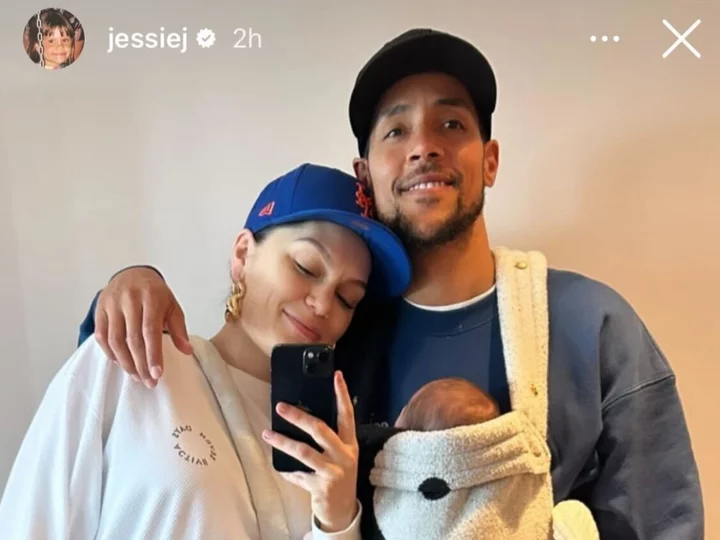
Jessie J announces name of her and Chanan Safir Colman’s baby boy
Jessie J has revealed the name of her newborn baby, who she welcomed last month with partner Chanan Safir Colman. The “Domino” singer has been enjoying being a new mother and celebrated her son’s one-month milestone on Sunday (11 June). Today (Monday 12 June), she posted a new photograph of her baby boy and wrote in the caption: “Mans like… Sky Safir Cornish Colman.” Jessie, whose full name is Jessica Cornish, also shared several snaps from the day she gave birth to Sky on her Instagram Stories. In one photo, she is pictured still in her hospital dressing gown with her son on her chest. In one photo, she is making a fist pump gesture, indicating her happiness at having given birth. Another post is a selfie of her, Colman and Sky posing in front of a mirror and smiling as a family. To mark his first month, Jessie shared a reel including the first moments of Sky’s birth. She said that the past 30 days have “felt like one long best day of my entire life”. “Mummy and Daddy love you more than anything in this world baby boy,” she added. Jessie also thanked her fans for following her pregnancy and motherhood journey, adding: “Please join me in sharing in my joy.” Colman also shared a black-and-white photo of him holding Sky in his hands to commemorate the baby’s first month of life. He wrote: “Since you were born, work, food and sleep seem completely irrelevant. When you look deep into my soul while taking the biggest s*** in my hands, I smile, when you pee all over me while I change you, I laugh, when you frantically kiss/suck on the side of my face, shoulder or neck looking for your mother’s breast, my heart smiles, and when you fall asleep on me with your arms wrapped around me, I feel complete.” Last January, Jessie revealed that she was pregnant one year after she suffered a miscarriage. At the time, the singer said she was “so happy and terrified” to share the news and asked fans to “be gentle with me”. Announcing the birth of her son, she wrote on her Instagram Story that her heart “grew twice the size”. “I am flying in love. He is magic. He is all my dreams come true. He is my whole [world]. He and I are both doing great,” she said. “I am soaking up every second and can’t believe he is real, here, and mine.” The singer previously kept her baby’s father’s identity under wraps, but recently revealed that her partner is the Danish-Israeli basketball player Colman. “I struggle to keep things private. I think if you know me you know that. I want to protect people I love and keep it for just myself...and then so often I think f*** it because life is short but I don’t want to regret it,” she said in an Instagram post. Cornish shared that she met Colman during a difficult time after she had dealt with her miscarriage in 2021 and described him as a “beam of light”. “He lit up my dark days. It was a whirlwind love and a miracle that we fell pregnant naturally with not one issue during,” she recalled. Read More Shapewear is booming, and body image experts are worried: ‘It’s really dangerous’ Kelis addresses Bill Murray dating rumours for the first time OnlyFans model Elle Brooke praised for ‘perfect’ response to Piers Morgan’s concerns about her career
1970-01-01 08:00
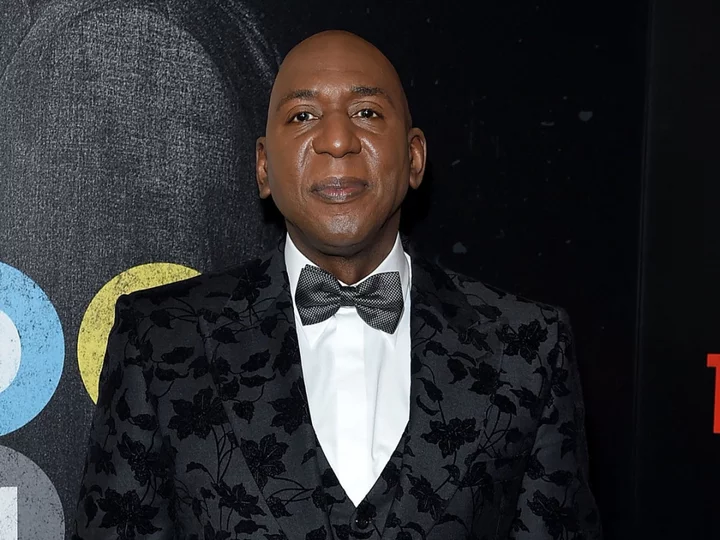
Colin McFarlane diagnosed with prostate cancer
Colin McFarlane has revealed that he has been diagnosed with prostate cancer. The Dark Knight star, 61, said he discovered the condition nine months after his brother was also diagnosed with the same cancer. McFarlane, also known for his roles in Doctor Who and Outlander, explained that both he and his brother found out about the cancer after taking a prostate-specific antigen (PSA) test, which can be given to men without symptoms after a consultation with a doctor. The actor said that he has been regularly testing for cancer after a fellow actor who was treated for it 17 years ago told him about its prevalence among Black men. He said: “I was already aware of the risk to me, so had been having annual and then six-monthly regular PSA blood tests with my GP. “Thankfully, just over a year ago, I had told my brother to get a PSA blood test otherwise he wouldn’t have been diagnosed, because he had no symptoms.” He added that he is “one of the lucky ones” as he has been “able to catch this very early”. McFarlane added: “So, although I have been diagnosed with prostate cancer, I do not require any treatment. “I am being regularly monitored with PSA blood tests every three months and an MRI (or magnetic resonance imaging scan) once a year.” “As it’s a very slow-moving cancer I am in the best possible position to ascertain what treatment I would need in the future if that were ever deemed necessary, and currently that scenario is a long way off,” he continued. “It’s men who take no action and don’t know anything about their prostate health that are at the greatest risk.” His diagnosis arrived on the same day as his late mother Gwendolyn’s birthday. She died at the age of 94 earlier this year. McFarlane is backing Prostate Cancer UK’s campaign to encourage men over 50 and Black men over 45 to get a PSA test, as a result of his experience. The charity said that Black men are at double the risk of getting the disease, with one in four expecting to get it in their lifetime, compared to one in eight among other men. McFarlane said: “Too many men black men are dying from prostate cancer. They need to know that a simple blood test could save their life.” In The Dark Knight, McFarlane appeared as Gotham City police commissioner Gillian B Loeb, alongside Christian Bale and Sir Michael Caine. He has also made several appearances in Doctor Who and is the voice of The Cube on the ITV game show. Additional reporting by PA Read More Shapewear is booming, and body image experts are worried: ‘It’s really dangerous’ Kelis addresses Bill Murray dating rumours for the first time Prince Andrew ‘staying in Royal Lodge amid renovations in case he is evicted’ Men’s Health Week: How to talk about sensitive or ’embarrassing’ health issues 13 cancer symptoms you should get checked now
1970-01-01 08:00

Amy Schumer says she stopped taking Ozempic because of side-effects
Amy Schumer has opened up about the reason why she stopped taking Ozempic, as she urged celebrities to be honest about their weight loss. The 43-year-old actor and comedian appeared on Watch What Happens Live with Andy Cohen on Thursday (8 June), where she revealed that tried taking the type 2 diabetes drug Ozempic for weight loss last year. “Like a year ago, I tried it,” she told Cohen, before admitting that she stopped taking the FDA-approved medication because of its side effects. “I was one of those people that felt so sick and couldn’t play with my son,” Schumer explained, referring to her four-year-old son Gene, who she shares with husband Chris Fischer. “I was so skinny and he’s throwing a ball at me and [I couldn’t].” Although the Trainwreck star admitted that she was “immediately invested” before trying the drug, she ultimately decided that Ozempic wasn’t “livable” for her. However, Schumer did take a moment to call out celebrities who have been “lying” about taking the once-weekly antidiabetic injection for weight loss. “Everyone’s like: ‘Smaller portions,’” she joked. “Shut the f*** up. You’re on Ozempic, or one of those things.” Much like Ozempic, FDA-approved medications Wegovy and Mounjaro are also brand names for semaglutide – which work by mimicking a hormone that regulates appetite and creates the feeling of fullness. “Just stop,” Schumer added. “Just be real with the people.” The Inside Amy Schumer star even noted how she was open about undergoing liposuction for weight loss in January 2022. “When I got lipo, I was like, I got lipo,” she said. Ozempic, a once-weekly injection used for the treatment of type 2 diabetes, has skyrocketed in use after people were reportedly prescribed the diabetes medication as an “off-label” weight loss drug. Meanwhile, Wegovy and Mounjaro are once-weekly semaglutide injections specifically approved for the treatment of obesity and weight loss. There are many side effects of taking medications like Ozempic, Wegovy, and Mounjaro. According to the US Food and Drug Administration (FDA), the most common side effects of taking Wegovy include nausea, diarrhea, vomiting, constipation, abdominal pain, headache, fatigue, indigestion, dizziness, and digestive disorders. The FDA has also warned against more serious complications that can occur from using Wegovy or Mounjaro, such as the “potential risk of thyroid C-cell tumours,” pancreatitis, gallbladder problems, acute kidney injury, increased heart rate, and suicidal behaviour or thinking. Meanwhile, taking Ozempic can lead to possible thyroid tumours, including cancer, pancreatitis, changes in vision, and kidney and gallbladder problems. Amy Schumer isn’t the only celebrity to open up about taking certain medications for weight loss. Comedian Chelsea Handler previously revealed that she “didn’t know” she was on Ozempic because her doctor allegedly “hands it out to anybody”. During an appearance on Alex Cooper’s Call Her Daddy podcast in January, the Chelsea Lately star spoke candidly about the alleged widespread use of Ozempic in Hollywood and her concerns over its popularity. “So, my anti-ageing doctor just hands it out to anybody,” Handler claimed. “I didn’t even know I was on it. She said: ‘If you ever want to drop five pounds, this is good.’” She said she realised she was taking the type 2 diabetes drug for weight loss after feeling nauseous while at lunch with a friend, who was also on Ozempic. When her friend asked if Handler was taking the medication, which the comedian referred to as “semaglutide” during their conversation, her friend informed her Ozempic was simply a brand name for semaglutide. However, Handler said she stopped taking the medication after she realised what it was. “I’m not on it anymore. That’s too irresponsible,” she shared. “I’m an irresponsible drug user, but I’m not gonna take a diabetic drug. I tried it, and I’m not gonna do that. That’s not for me. That’s not right for me.” Read More Shapewear is booming, and body image experts are worried: ‘It’s really dangerous’ OnlyFans model Elle Brooke praised for ‘perfect’ response to Piers Morgan’s concerns about her career Prince Andrew ‘staying in Royal Lodge amid renovations in case he is evicted’ STI cases at record highs: 6 things everyone needs to know about sexually transmitted infections Men’s Health Week: How to talk about sensitive or ’embarrassing’ health issues Jonnie Irwin explains why he hasn’t told his sons about his terminal cancer
1970-01-01 08:00
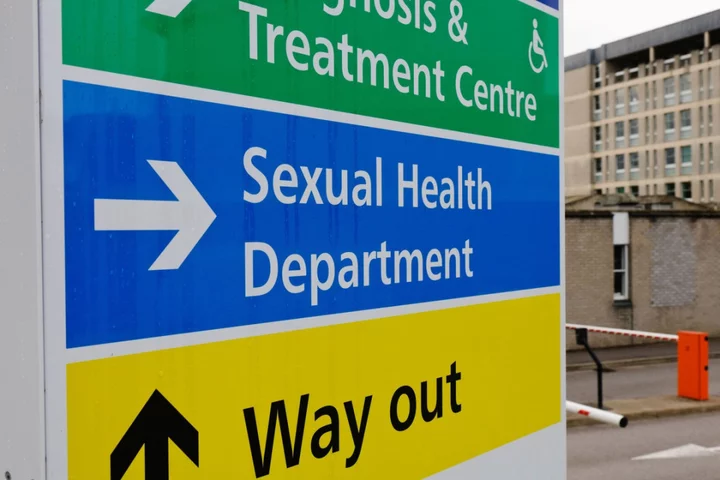
STI cases at record highs: 6 things everyone needs to know about sexually transmitted infections
Cases of gonorrhoea in England have reached record highs, while syphilis cases are at the highest level since just after the Second World War, according to the UK Health Security Agency (UKHSA). Gonorrhoea diagnoses rose to 82,592 in 2022, an increase of 50.3% compared to 2021, while infectious syphilis cases increased to 8,692 in 2022, the largest annual number since 1948. As well as gonorrhoea and syphilis, it’s important to be aware of the risk around all sexually transmitted infections (STIs) including chlamydia, genital herpes, genital warts and HIV. As Dr Hamish Mohammed, consultant epidemiologist at UKHSA, pointed out: “STIs aren’t just an inconvenience – they can have a major impact on your health and that of any sexual partners.” Here, sexual health experts talk through what you need to know about STI prevention, testing and treatment… 1. Anyone can potentially get an STI “Don’t think that because you haven’t caught one in the past – or because you only sleep with people that you don’t think have STIs – that you are immune, because the truth is that no one is,” Sarah Mulindwa, a specialist sexual health nurse who is working with Lovehoney, told PA Media. Regardless of gender, sexual orientation, whether you have lots of partners or you’re in a monogamous relationship, anyone can potentially get an STI. And they affect all age groups, too. “There’s no upper age limit on getting an STI,” Julie Bowring, consultant gynaecologist in sexual and reproductive health at London Gynaecology, added. The number of common STIs caught among the over 65s in the UK increased by 20% from 2017 to 2019, according to the Local Government Association. This may in part be due to differences in health awareness. “When that generation of patients were at school, they didn’t get quite as good and comprehensive sexual health education as we get now,” Bowring said. “And if you look at all the media campaigns for sexual health infections, it’s usually targeted at a younger demographic.” 2. Not all contraceptives protect against all STIs “It’s a common myth that when you’re on regular contraception, you might have protection against STIs,” said Bowring. “I think that can sometimes be missing in information that’s given to patients when they start contraception.” While birth control methods such as the pill, coil or IUD will protect against unintended pregnancy, they won’t protect against STIs. “Condoms [or dental dams] are the only effective method of protecting against STIs if you are sexually active,” said Mulindwa. “And even then, only when you use them correctly: wearing one to cover the whole length of the penis, and using from start to finish of sex, including during oral, anal, or vaginal penetration.” 3. Symptoms can vary greatly With a wide range of symptoms that vary in severity, STIs can sometimes be difficult to spot. “Certain STIs, such as chlamydia for example, might not even present any symptoms in the person that has it,” Mulindwa explained. “If you are experiencing any form of discomfort in and around your genitals, then it is imperative that you get tested right away.” Other signs may include an unusual discharge from the vagina, penis or anus; pain when peeing; lumps or skin growths around the genitals or anus; a rash; unusual vaginal bleeding; itchy genitals or anus; and blisters, sores or warts around these areas. “It can be quite difficult for women to sometimes know when a symptom might be STI related,” added Bowring. “It could be their periods, it could be something non-STI related. If there is a risk of infection and you have noticed a change in either your discharge or your pain, then it is worth getting checked out.” 4. Routine testing is a good idea Because some infections don’t result in any symptoms, routine testing is important. “If you’ve changed partner then it’s a good idea, if you haven’t had STI screening, to attend your local service to get that done,” Bowring advised. Home testing kits are also available with swabs and finger-prick blood tests. “It’s recommended that you screen at least every six months for the most common infections – chlamydia and gonorrhoea – and yearly for blood tests to screen for HIV, syphilis, and hepatitis C,” Mulindwa added. “Depending on your risk factors, you may need to screen more frequently.” 5. Treatments are available STIs are extremely common and there’s no need to feel embarrassed or ashamed if you do catch one, and treatments are available. “The majority of STIs are curable, and even those that aren’t – for example, herpes – have treatments available to manage outbreaks,” said Mulindwa. “Some STIs like chlamydia are treatable with a course of antibiotics, and others require creams and ointments.” 6. Options for people with HIV have come a long way Thanks to scientific breakthroughs, providing they have access to treatment, most people with HIV will not develop any AIDS-related illnesses and can live full lives. “There are now options available that can stop HIV reproducing in the body and prevent you from passing it on, as well as drugs designed to prevent infection if you have been exposed,” said Mulindwa. “People who are HIV positive and are undetectable (which means the level of the virus is very low) are unable to pass it on even when they have unprotected sex.” A relatively new drug called Pre-Exposure Prophylaxis (PrEP) – designed to reduce the chance of contracting HIV – can be helpful for people who may be at increased risk. Health professionals at NHS sexual health clinics can talk you through the options for preventing and managing HIV. Read More Charity boss speaks out over ‘traumatic’ encounter with royal aide Ukraine war’s heaviest fight rages in east - follow live What’s wrong with my roses? Men’s Health Week: How to talk about sensitive or ’embarrassing’ health issues Prince William responds after three guardsman collapse during UK heatwave
1970-01-01 08:00
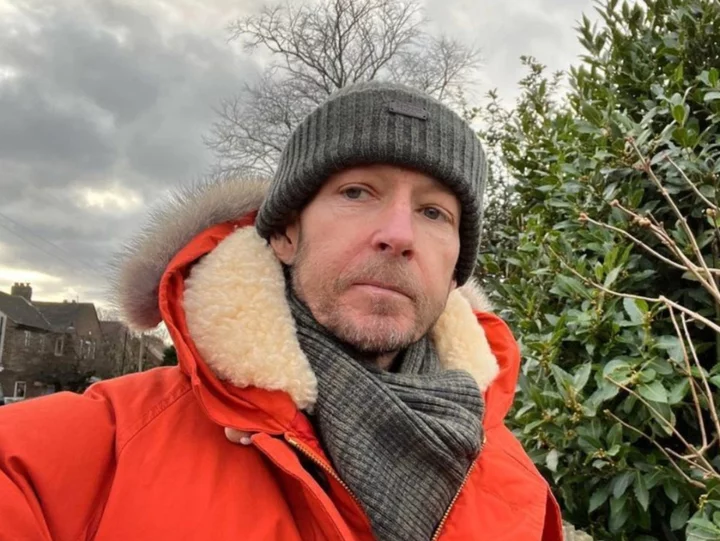
Jonnie Irwin explains why he hasn’t told sons about his terminal cancer: ‘Let’s bury our heads in the sand’
Jonnie Irwin has opened up about why he hasn’t told his three children that he has terminal cancer. The A Place in the Sun presenter, 49, publicly revealed his diagnosis in November 2022 after his lung cancer spread to his brain. However, his young sons, who he shares with wife Jessica Holmes, do not know that their father is dying. Irwin says it would be difficult for them to understand his situation at this age: his eldest son Rex is four-and-a-half, while twins Rafa and Cormac are turning three this month. In a new interview with Hello! magazine ahead of Father’s Day, Irwin said: “I keep being asked, ‘Are you going to tell them?’ but tell them what? “It would be horrible news that they’d have to get their heads around. And it would confuse the hell out of Rex – he’s got a shocking enough day coming. Let’s bury our heads in the sand for as long as possible.” In the meantime, Irwin and Holmes are trying to give their children a sense of normalcy by continuing to teach and play with them. Holmes described the presenter as a “great dad and a big kid himself”, adding: “All the boys gravitate to him when they want to show off and get his attention. They’re aware that Jonnie needs his rest and can’t always jump up and play football for hours, but they’re more than happy snuggled up on the sofa, watching a movie. “Story time is a big thing at bedtime and that is something I know Jonnie treasures with them.” In November, when Irwin first revealed his diagnosis, he said Rex “doesn’t need to know” about his illness yet. “We make fun of my hair – he calls it my ‘spiky head’ – but as far as he’s concerned, his dad is normal and why would I shatter that innocence?” Earlier this month, Irwin was admitted to hospital to be “monitored” as his treatment continues. He shared in an Instagram post that he was admitted to keep an eye on a “changeover in my pain management regime”. In an appearance on the OneChat podcast by insurer AIG Life, Irwin said he had been close to dying “at least twice”. “You lose your memory, you lose your patience. I have got a very short temper. It’s not made me a better person, that’s for sure,” he admitted. However, Irwin emphasised that he prefers to think of his situation as “living with cancer, rather than dying from cancer”. Read More A Place In The Sun’s Jonnie Irwin admitted to hospital amid terminal diagnosis Jonnie Irwin says he’s been ‘close to death’s door twice, at least’ Jonnie Irwin says going public with terminal cancer diagnosis was day he began ‘living again’
1970-01-01 08:00
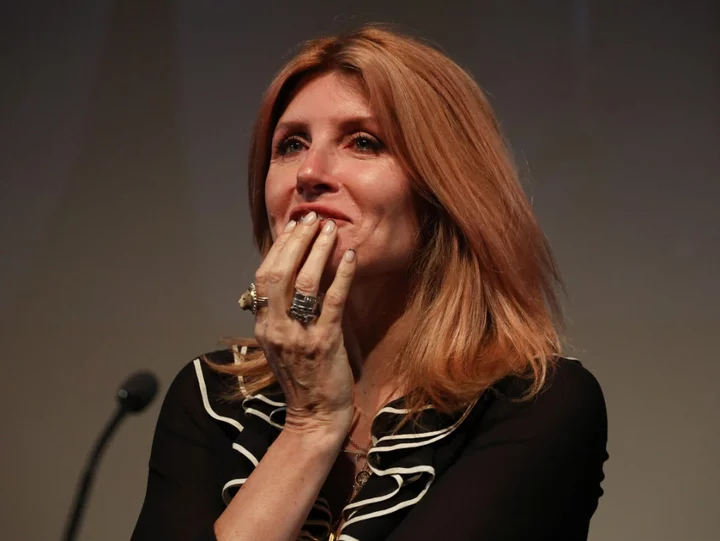
Sharon Horgan says she has PTSD from daughter’s health scare
Sharon Horgan has opened up about having post-traumatic stress disorder (PTSD) after her eldest daughter was diagnosed with meningitis as a baby. The Irish actor, who will star in the forthcoming BBC One drama Best Interests with Michael Sheen, said she drew on the experience in order to play her character in the new series. Horgan’s daughter survived the life-threatening illness, but it left an “aftershock” on her mother. “We were so unbelievably lucky and we know that,” the Bad Sisters star told The Times in a new interview, published today (Sunday 11 June). “But the aftershock – there’s definitely PTSD and I dealt with any of my second daughter’s illnesses with blind panic because you always think, ‘If it can happen, why couldn’t it happen again?’” Both of Horgan’s daughters, Sadhbh and Amer, are now teenagers. She shares them with her ex-husband, Jeremy Rainbird. Best Interests tells the story of Nicci (Horgan), a mother who sues the NHS after doctors decide her Marnie (Niamh Moriarty) should be taken off life support after her condition, muscular dystrophy, deteriorates. Horgan stars opposite Sheen, who plays Nicci’s husband Andrew. In the show, Andrew is torn between his love for Marnie and his unwillingness to support his wife’s case. The friction between Nicci and Andrew shows that they “had a real relationship that has difficulties”, Horgan said. “When things get really, really bad, the accusations are there, a certain amount of finger-pointing, which happens anyway, just even in normal parenting,” she explained. After her divorce from Rainbird in 2019, Horgan said the adjustment to co-parenting made her doubt if she was a good mother. During an appearance on Desert Island Discs in 2020, she told host Lauren Laverne: “I was fun mum for years. I entirely thought that was my role but that changes when you co-parent. “Everything changes and you take on a lot more roles and I am much more practical than I was, and I think that is a positive thing.” She continued: “It had some dips in the middle where I thought, ‘Oh, that thing I thought I was, which was a good mother, I am not entirely sure about’. “When you bring anything like that into your kid’s life it’s tricky, when you turn the roles upside down, but it balances out and everything eased back.” Read More Shapewear is booming, and body image experts are worried: ‘It’s really dangerous’ Chris Hemsworth thanks wife Elsa Pataky for her ‘forgiveness’ Kelis addresses Bill Murray dating rumours for the first time Sharon Horgan opens up about ‘aftershock’ after daughter’s meningitis Jamie Foxx’s rep addresses conspiracy Covid vaccine left actor ‘paralyzed and blind’ Debate sparker over parent who wouldn’t give her daughter any birthday cake
1970-01-01 08:00
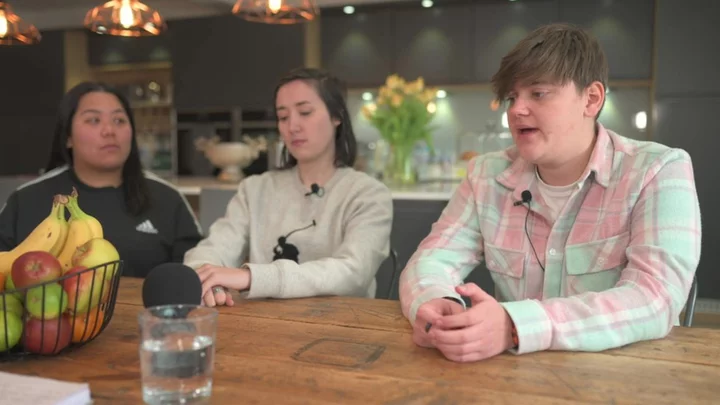
Wales adoptees hope to break taboo of identity struggle
A podcast featuring Welsh adoptees aims to tackle myths about adoption.
1970-01-01 08:00
